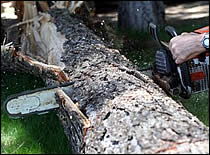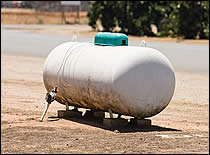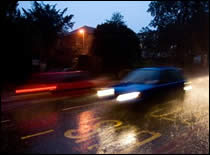Fact Sheet: Prevent Injury after a Disaster
HIGHLIGHTS
- To prevent carbon monoxide poisoning, only use generators, pressure washers, grills, camp stoves, or other gasoline, propane, natural gas, or charcoal-burning devices outside and away from open windows, doors, and air vents.
- Follow chain saw safety rules and use chain saws according to manufacturer instructions.
- Avoid wild or stray animals.
- Avoid the use of electric tools or appliances while standing in water.
- Drive safely, always wear your seatbelt, don’t drink and drive, and don’t drive when sleepy.
For information and materials for specific injury prevention topics such as driving safely, falls, violence prevention and trenchfoot see Resources for Preventing Injury after a Disaster.
Protect Yourself from Animal- and Insect-Related Hazards
 Avoid wild or stray animals and biting or stinging insects.
Avoid wild or stray animals and biting or stinging insects. - Call local authorities to handle animals.
- Get rid of dead animals, according to local guidelines, as soon as you can.
- For more information, contact your local animal shelter or services, a veterinarian, or the Humane Society for advice on dealing with pets or stray or wild animals after an emergency.
For information on specific animal and insect issues, see Protect Yourself from Animal - and Insect-Related Hazards After a Natural Disaster.
Prevent Carbon Monoxide Poisoning
Carbon monoxide (CO) is an odorless, colorless gas that can cause sudden illness and death if you breathe it. When power outages occur during emergencies such as hurricanes or winter storms, you may try to use alternative sources of fuel or electricity for heating, cooling, or cooking. CO from these sources can build up in your home, garage, or camper and poison the people and animals inside.
- Never use generators, pressure washers, grills, camp stoves, or other gasoline, propane, natural gas, or charcoal-burning devices inside your home, basement, garage, or camper—or even outside near an open window, door, or vent.
- Don't heat your house with a gas oven.
- If you are too hot or too cold, or you need to prepare food, don't put yourself and your family at risk of CO poisoning—look to friends, family, or a community shelter for help.
- If your carbon monoxide detector sounds, leave your home immediately and call 911.
- Seek prompt medical attention if you suspect carbon monoxide poisoning and are feeling dizzy, light-headed, or nauseated.
For further guidance on avoiding CO poisoning, see Protect Yourself from Carbon Monoxide Poisoning After an Emergency.
Use Chain Saws Safely
-
 Operate, adjust, and maintain the saw according to manufacturer's instructions. Periodically check and adjust the tension of the chain saw blade.
Operate, adjust, and maintain the saw according to manufacturer's instructions. Periodically check and adjust the tension of the chain saw blade. - Wear appropriate protective equipment , such as hard hat, safety glasses, hearing protection, heavy work gloves, and cut-resistant legwear.
- Avoid contact with power lines.
- Always cut at waist level or below.
- Be sure that bystanders are at a safe distance from cutting activities.
- With an electric chain saw, use extreme caution to avoid electrical shock.
- Take extra care in cutting trees or branches that are bent, twisted, hung up on, or caught under another object during a high wind. If the tree or the branch is suddenly released, it may strike the person cutting it, or a bystander.
For further guidance, see Preventing Chain Saw Injuries During Tree Removal After a Hurricane.
Avoid Electrical Hazards
- Never make contact with power lines, regardless of whether they are on the ground or intact. Do not drive through standing water if downed powerlines are in the water. If a powerline falls across your car while you are driving, stay inside the vehicle and continue to drive away from the line.
- Never turn power on or off yourself or use an electric tool or appliance while standing in water. If electrical circuits and electrical equipment have gotten wet or are in or near water, turn off the power at the main breaker or fuse on the service panel. If you must enter standing water to access the main power switch, then call an electrician to turn it off.
- If you see frayed wiring or sparks when you restore power, or if there is an odor of something burning (whether fire is visible or not), immediately shut off the electrical system at the main circuit breaker.
- Consult your utility company about how to install and use power generators properly.
For further guidance, see How to Protect Yourself and Others from Electrical Hazards Following a Natural Disaster.
Be Aware of Dangerous Materials
 Call the fire department to inspect or remove chemicals, propane tanks, and other dangerous materials.
Call the fire department to inspect or remove chemicals, propane tanks, and other dangerous materials. - Wear protective clothing and gear (for example, a respirator if needed) when handling hazardous materials.
- Wash skin that may have come in contact with hazardous chemicals.
- Wear insulated gloves and use caution if you have to remove a car battery. Car batteries can maintain an electrical charge even if flooded. Avoid any acid that may have leaked from a car battery.
For information about possible dangers posed by chemicals, see the Chemical Emergencies page. For information about possible dangers posed by pollution from large farms and agricultural facilities, see the CDC Concentrated Animal Feeding Operations (CAFOs) website.
Beware of Drowning Hazards
- Avoid moving water, regardless of depth or speed. Do not drive through flooded roads. Cars can be swept away or break down. Follow all warnings about water on roadways.
- If you have to work in or near floodwater, wear a life jacket. If you are caught in an area where floodwater is rising, wear a life jacket, or wear or keep at hand some other type of flotation device.
Prevent Fires
- If possible, use flashlights or other battery-operated lights instead of candles.
- If you use candles, make sure you put them in safe holders away from curtains, paper, wood, or other flammable items.
- Do not leave a burning candle unattended.
- When cleaning up, be sure to have at least two fire extinguishers, each with an Underwriters Laboratories (UL) rating of at least 10A, at every cleanup job.
Be Alert to Gas Leaks
- If you smell gas or suspect a leak, leave the house immediately. Notify emergency authorities and do not turn on the lights, light matches, smoke, or do anything that could cause a spark.
- Do not return to the house until you are told it is safe to do so.
Reduce Temperature–Related Risks
- When standing or working in water which is cooler than 75 degrees F (24 degrees C):
- Wear rubber boots.
- Ensure that clothing and boots have adequate insulation.
- Take frequent breaks out of the water.
- Change into dry clothing when possible.
- Prevent heat–related illness:
- Stay in air-conditioned buildings.
- Take breaks in shaded areas or in cool rooms.
- Drink water and nonalcoholic fluids often.
- Wear lightweight, light-colored, loose-fitting clothing.
- Do outdoor activities during cooler hours.
For further guidance, visit the CDC Extreme Heat Web site.
Prevent Falls
Ladder Safety:
- Stand your ladder on flat ground.
- Do not stand on top two steps of a ladder.
- Stand in center of ladder step.
- Never use a folding ladder when it is closed. Open the ladder and press the side locks into place.
- While on a ladder, do not reach to the side.
- While on a ladder, do not push or pull anything.
Roof safety:
- To reach a roof, use a ladder that is at least three feet higher than the edge of the roof.
- Be careful when on a roof. Roofs are usually slick, sloped and high above the ground.
Drive Safely
 Be alert for broken stop lights and missing street signs.
Be alert for broken stop lights and missing street signs. - Treat intersections where lights are out as a four-way stop.
- Avoid driving through water, especially when it is fast moving.
- As little as six inches of water may cause you to lose control of your car or truck.
- Two feet of water will carry most cars away.
- Do not drive through standing water if fallen power lines or electrical wires are in the water.
- If a power line or electrical wire falls on your car or truck while you are driving:
- Continue to drive away from the wire.
- Do not turn off the ignition, even if the engine stalls.
- Stay in your car or truck and wait for emergency workers.
- Do not allow anyone other than emergency workers to approach your car or truck.
- Slow down and drive at a speed that is safe for road and weather conditions.
- Watch out for trash and debris on the road.
- Keep space between you and other drivers.
- Wear your seatbelt at all times.
- Do not drive, if you have been drinking or are sleepy.
- Be sure your child rides in a child safety seat or booster sear, correctly installed in the back seat, on every trip.
- Carry basic supplies in your car or truck, such as water, food, blanket, and first aid kit.
- Gasoline is extremely flammable and dangerous. Do not carry extra fuel in your car or truck. If you feel you must carry extra fuel, then follow these safety tips:
- Use only metal or plastic containers approved for gasoline storage.
- Do not fill the container all the way to allow for heat expansion.
- To reduce danger from static electricity fill portable containers on a flat surface on the ground and not in the vehicle.
- After filling containers, tighten all caps, wipe off any spilled fuel, and secure containers to avoid tipping.
- After reaching your destination, remove gasoline containers from your vehicle and store in a well ventilated area. Use the stored gasoline as soon as possible.
Prevent or Treat Wounds
- Immediately clean out all open wounds and cuts with soap and clean water. Keep wounds covered with clean, dry bandages that are large enough to cover the wound and contain any pus or drainage. Change bandages as needed and when drainage can be seen through the bandage. Contact a doctor to find out whether more treatment is needed (such as a tetanus shot). If a wound gets red, swells, or drains, seek immediate medical attention.
- Avoid wild or stray animals. If you are bitten by any animal, seek immediate medical attention. If you are bitten by a snake, try to identify it, so that if it is poisonous, you can be given the correct anti-venom. Do not cut the wound or attempt to suck the venom out. (See also the CDC Rabies website, Rat-Bite Fever: Frequently Asked Questions, and Medical Problems and Treatment Considerations for the Red Imported Fire Ant
 [PDF, 658 KB/8 pages]. )
[PDF, 658 KB/8 pages]. ) - If your skin or eyes may have come in contact with hazardous materials, such as acid from a car battery, wash thoroughly with decontaminated water and seek medical attention as needed.
- If you have wounds, you should be evaluated for a tetanus immunization, just as you would at any other time of injury. If you receive a puncture wound or a wound contaminated with feces, soil, or saliva, have a doctor or health department determine whether a tetanus booster is necessary based on individual records.
For further guidance, see Emergency Wound Care After a Natural Disaster.
Protect Yourself from Other Injuries
- Stay away from damaged buildings or structures until they have been examined and certified as safe by a building inspector or other government authority. You may want to wait to return to buildings during daylight hours, when it is easier to avoid hazards, particularly if the electricity is off and you have no lights.
- Leave immediately if you hear shifting or unusual noises that signal that the structure may fall or if you smell gas or suspect a leak.
- Use teams of two or more people to move bulky objects. Avoid lifting any material that weighs more than 50 pounds (per person).
- Wear hard hats, goggles, heavy work gloves, and watertight boots with steel toe and insole (not just steel shank) for cleanup work.
- Wear earplugs or protective headphones to reduce risk from equipment noise.
- Avoid wading in water. Glass, metal fragments, and other debris may be in the water.
- Pace yourself and get help to avoid both physical and emotional exhaustion.
Monitor your radio or television for up-to-date emergency information.
- Page last updated March 27, 2009
- Page last updated March 27, 2009
- Content source: National Center for Environmental Health (NCEH)/Agency for Toxic Substances and Disease Registry (ATSDR), National Center for Injury and Violence Prevention and Control (NCIPC)
Get email updates
To receive email updates about this page, enter your email address:
Contact Us:
- Centers for Disease Control and Prevention
1600 Clifton Rd
Atlanta, GA 30333 - 800-CDC-INFO
(800-232-4636)
TTY: (888) 232-6348 - Contact CDC-INFO


